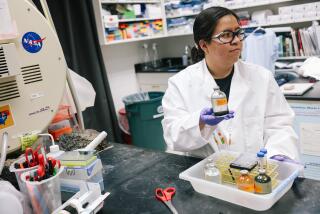SDSU, Salk Institute to Strengthen Links : Research: Program expected to help lure nation’s top graduate students to La Jolla campuses.
- Share via
UC San Diego and the Salk Institute for Biological Studies on Monday established a cooperative graduate teaching and research program that will put Salk scientists in the classroom and offer graduate students new laboratory research opportunities.
The program boosts UCSD to a level where it will become “an extremely attractive magnet for national attention, for grants and graduate students,” said Ted Case, chairman of the biology department.
For the record:
12:00 a.m. Dec. 16, 1992 For the Record
Los Angeles Times Wednesday December 16, 1992 San Diego County Edition Metro Part B Page 2 Column 4 Metro Desk 2 inches; 38 words Type of Material: Correction
Research links--A headline on a story Tuesday in The Times gave the incorrect name of the university with which the Salk Institute of Biological Studies is establishing a cooperative graduate teaching and research program. The headline should have said UC San Diego.
Under the agreement, 27 of Salk’s 47 faculty members will join the 60-member UCSD biology faculty. That blending of research and teaching expertise in La Jolla makes UCSD’s graduate program in biology “the equivalent of any in the country,” said Geoff Wahl, a Salk Institute cancer researcher.
“Look at Harvard, Caltech, MIT . . . all the places held up as the gold standard . . . and San Diego is now one of them,” Wahl said. “In addition (to academic opportunities) we also have the biotechnology companies in which (graduates) can market their experience.”
The two La Jolla institutions have maintained a loose-knit collaboration since their creation during the 1960s. Some Salk researchers have held adjunct teaching positions at UCSD and opened their laboratories to graduate and post-doctoral students.
But UC San Diego Chancellor Richard Atkinson and Salk Institute President Renato Dulbecco on Monday formalized that collaboration by creating the graduate program in biological science.
The joint program blends Salk’s strengths in molecular neurobiology--the molecules that are used for communication among brain cells--with UCSD’s expertise in plant biology, microbiology and population biology. Salk researchers will teach graduate and undergraduate classes and open additional laboratories on their La Jolla campus to UCSD graduate students.
UCSD now draws 800 applicants for 30 annual openings in its graduate program, Case said. With UCSD’s existing faculty, the university regularly draws students from “the top 5% (of potential candidates),” Case said. “We want to draw from the top 1%, and this (agreement) will help us.”
In addition to improving the quality of applicants, the alliance with Salk will allow UCSD gradually to increase the number of grad students enrolled each year.
Byron Sebastian, 24, applied to UCSD’s graduate program three years ago, in part because of the university’s past alliance with Salk. The University of Chicago graduate, who is studying cell growth in a Salk laboratory, described the Salk agreement as a “real drawing card” when it comes to luring top students to UCSD.
Graduate and post-doctoral students use their time in UCSD and Salk research laboratories for different purposes.
“While post-doctoral students have their own ideas and want to pursue their own lines of investigation . . . graduate students are true students so you teach them, you nurture them intellectually,” said Wahl, who regularly opens his cancer-research laboratory to students.
For graduate students, research laboratories offer an important chance to explore how classroom learning applies in the real world.
Senior researchers often use graduate students to chase “high-risk” projects that they can’t dedicate their own time to, Wahl said. “If it works, it’s fabulous,” Wahl said. “But if it doesn’t, it still gives them a valuable (learning) experience.”
Salk researchers also will benefit from the increased number of students at the Institute’s bluff-top campus in La Jolla, said Bart Sefton, a professor of molecular biology and virology at Salk and an adjunct professor at UCSD.
“Most (researchers) feel that graduate students are a valuable intellectual component of any laboratory,” Sefton said. “They make sure that all generations are represented (in ongoing research) . . . and they also help make conservative (researchers) do their jobs better by making them think differently.”
Wahl said graduate and post-doctoral students “have gone through the newest courses in their own schools, so they can teach us a few things.”
More to Read
Sign up for Essential California
The most important California stories and recommendations in your inbox every morning.
You may occasionally receive promotional content from the Los Angeles Times.













